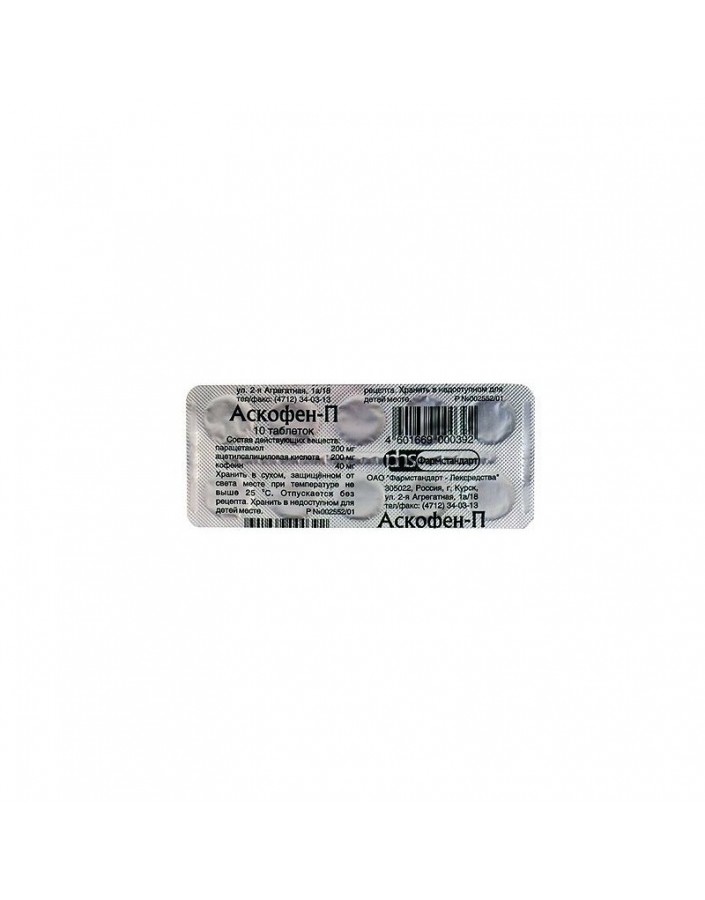




Security policy (edit with Customer reassurance module)

Delivery policy (edit with Customer reassurance module)

Return policy (edit with Customer reassurance module)
Pills
1 pill contains Acetylsalicylic acid 200 mg, Paracetamol 200 mg, caffeine 40 mg;
Excipients: potato starch, low molecular weight polyvinylpyrrolidone, stearic acid, talc, Calcium monohydrate stearate, KE-10-12 silicone emulsion, vaseline oil.
10 tablets.
Ascofen P - a combination drug, has an analgesic, antipyretic, anti-inflammatory effect.
Acetylsalicylic acid has antipyretic and anti-inflammatory effects, alleviates pain, especially caused by inflammation, and also moderately inhibits platelet aggregation and thrombus formation, improves microcirculation in the focus of inflammation.
Paracetamol has analgesic, antipyretic and extremely weak anti-inflammatory effect, which is associated with its effect on the thermoregulation center in the hypothalamus and the weakly expressed ability to inhibit the synthesis of prostaglandins in peripheral tissues.
Caffeine increases the reflex excitability of the spinal cord, stimulates the respiratory and vasomotor centers, dilates the blood vessels of skeletal muscles, brain, heart, kidneys, reduces platelet aggregation; reduces sleepiness, fatigue, increases mental and physical performance.In this combination, a small dose of caffeine has little or no stimulating effect on the central nervous system, but it helps normalize the vascular tone of the brain and accelerate blood flow.
Moderate or mild pain syndrome of different etiology (headache, toothache, migraine, neuralgia, myalgia, arthralgia, disalgomenorrhea).
Feverish syndrome with acute respiratory infections and flu.
Increased individual sensitivity to the components of the drug;
erosive and ulcerative lesions of the gastrointestinal tract (in the acute phase);
gastrointestinal bleeding;
aspirin asthma;
hemophilia;
hemorrhagic diathesis;
hypoprothrombinemia;
portal hypertension;
avitaminosis K;
renal failure;
pregnancy (I and III trimesters);
lactation period (breastfeeding);
glucose-6-phosphate dehydrogenase deficiency;
severe hypertension;
severe ischemic heart disease;
glaucoma;
hyperexcitability;
sleep disorders;
surgical intervention involving bleeding;
children's age up to 15 years.
With caution: gout, liver disease.
Inside after meals, washing down with plenty of liquid (milk, alkaline mineral water).
1-2 pills 3 times a day after meals. The maximum daily dose is 6 tablets. The break between taking the drug should be at least 4 hours.
For the relief of pain syndrome - 2 pills once.
Askofn P should not be taken for more than 5 days as an analgesic and more than 3 days as an antipyretic (without prescription and medical supervision). Other dosages and regimens are prescribed by a doctor.
In case of impaired renal or liver function, the interval between doses is at least 6 hours.
Anorexia, nausea, vomiting, gastralgia, diarrhea, erosive and ulcerative lesions of the gastrointestinal tract, Gastrointestinal bleeding, hepatic and / or renal failure, increased blood pressure, tachycardia, allergic reactions (skin rash, Quincke edema, bronchospasm).
With long-term use - dizziness, headache, blurred vision, tinnitus, decreased platelet aggregation, hypocoagulation, hemorrhagic syndrome (nosebleeds, bleeding gums, purpura, etc.), kidney damage with papillary necrosis; deafness; Stevens-Johnson syndrome, toxic epidermal necrolysis (Lyell's syndrome), Rey's syndrome in children (metabolic acidosis, disorders of the nervous system and psyche, vomiting, abnormal liver function).
Children should not be prescribed drugs containing acetylsalicylic acid, because in the case of a viral infection they can increase the risk of Reye's syndrome. Symptoms of Reye’s syndrome are prolonged vomiting, acute encephalopathy, and enlarged liver.
Enhances the action of Heparin, indirect anticoagulants, reserpine, steroid hormones and hypoglycemic agents. Reduces the effectiveness of spironolactone, Furosemide, antihypertensive drugs, anti-gout remedies that promote the excretion of uric acid.
Strengthens the side effects of glucocorticosteroids, sulfonylurea derivatives, Methotrexate, non-narcotic analgesics and nonsteroidal anti-inflammatory drugs.
The combination of the drug with barbiturates, antiepileptic drugs, zidovudine, rifampicin and alcohol-containing beverages should be avoided (increases the risk of a hepatotoxic effect).
Under the influence of paracetamol, the time of chloramphenicol excretion is increased 5 times. Caffeine accelerates the absorption of ergotamine.
Salicylamide and other microsomal oxidation stimulants promote the formation of toxic paracetamol metabolites that affect liver function. Metoclopramide accelerates the absorption of paracetamol. With repeated use of paracetamol can enhance the effect of anticoagulants (dicoumarin derivatives).
Symptoms (caused by acetylsalicylic acid): for mild intoxication - nausea, vomiting, gastralgia, dizziness, tinnitus; severe intoxication - lethargy, drowsiness, collapse, convulsions, bronchospasm, difficulty breathing, anuria, bleeding. Initially, central hyperventilation of the lungs leads to respiratory alkalosis (shortness of breath, asphyxiation, cyanosis, perspiration).As intoxication increases, progressive respiratory paralysis and dissociation of oxidative phosphorylation cause respiratory acidosis.
Treatment: constant monitoring of acid-base balance and electrolyte balance; depending on the state of metabolism - the introduction of sodium bicarbonate, sodium citrate or sodium lactate. Increasing reserve alkalinity enhances the excretion of acetylsalicylic acid due to alkalization of urine.
Store in a dry, dark place at a temperature not exceeding 25 ° C.
Ascofen p